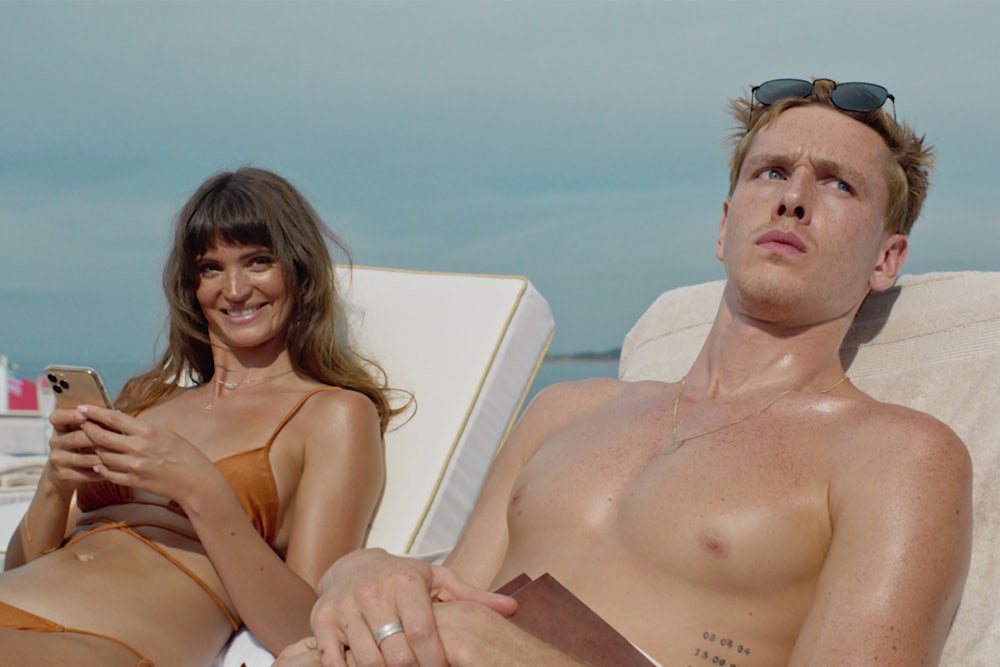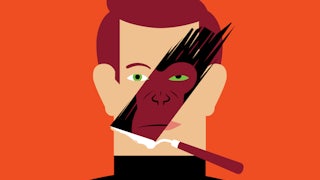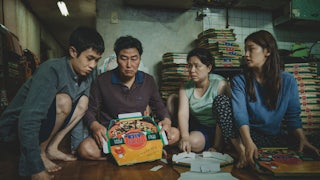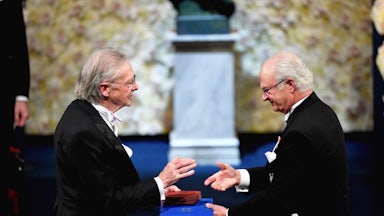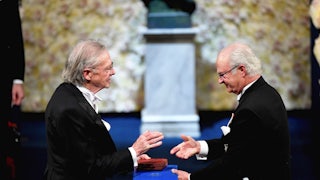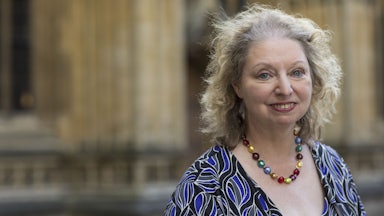When Luis Buñuel won his only Palme d’Or at the 1961 Cannes Film Festival, it was for Viridiana, a Spanish-Mexican co-production about a nun whose rich uncle attempts to rape her; the next day, after he hangs himself, she inherits his country estate, righteously inviting local beggars to reside there in her care. In the film’s climactic scene, Viridiana’s leprous wards besiege the mansion in blasphemous mockery of Leonardo da Vinci’s Last Supper, upon discovery of which, Buñuel’s camera strongly implies, the heroine goes to bed with her bastard cousin and their maid, having already tossed into the fire her crown of thorns.
Just seven years later, in 1968, Jean-Luc Godard and François Truffaut staged a boycott of the festival. Godard, who would never be awarded the Palme d’Or (Truffaut took home the trophy in 1959 for his directorial debut, The 400 Blows), derided the decadence of what he saw as a corporate trade show occupying the mezzanine of a proletarian revolution: “I’m talking about solidarity with the students and workers, and you’re talking about tracking shots and close-ups!” But for Godard, who died by assisted suicide in Switzerland this September, at 91, it was not only the Riviera, but the entirety of cinema, that was bereft and depraved: “There isn’t one film showing today that represents the problems going on … among workers and students. Not one, whether by Milos [Forman], myself, [Roman] Polanski, or François. There are none. We’re behind the times.” A Maoist by that point, Godard was not averse to self-criticism.
The final film to win the Palme d’Or during Godard’s lifetime was Triangle of Sadness, the sixth feature by the Swedish director Ruben Östlund (and his second to win the Palme d’Or, after 2017’s The Square). Tracking the tumultuous romance of Carl (Harris Dickinson) and Yaya (Charlbi Dean)—an attractive young couple that accepts a freebie vacation on a yacht—the film caricatures the precarity of the beautiful set afloat in the world of the rich, their fellow passengers a pointedly insufferable mix of upper-class (and comparatively unsexy) Europeans. Östlund’s vessel is no Titanic, but still, it sinks—off-screen, due to a grenade launched by pirates and subsequently mishandled by the elderly wife of an arms manufacturer. The survivors are no less motley or inept than a typical cast of the long-running CBS reality show, as Östlund mines humor from their struggles, their instant helplessness, and brutality when pried away from creature comforts.
From Michael Haneke, another consecutive winner at Cannes, Östlund borrows an almost philosophical fascination with the cruelty and isolation that lurks behind the banal exteriors of everyday reality. A commercial-looking hyperrealism, reminiscent of Yorgos Lanthimos and Bong Joon-ho, has emerged in his recent films, beginning with the grimly comic portrait of a marriage in crisis, 2014’s Force Majeure, and the art world satire of The Square. While the political edge of some of his international peers can be seen to have blunted as they slouch further towards Hollywood, Östlund has not lost interest in pissing people off. But more importantly, perhaps, he would like to make us laugh.
What is a “triangle of sadness”? At least three things. The film’s tripartite structure—three acts, each with a new setting—constitutes a sad triangle of its own. But the most direct explanation comes in the opening chapter, when a casting director admonishes Carl, a struggling model who has the look but not the walk, for his scowling forehead: “Can you relax your triangle of sadness?” (“Maybe he needs Botox,” another chimes in.)
A tediously circular argument between Carl and Yaya over whose habit and responsibility it is to pay for dinner escalates across the first act to establish the riotous stakes of the second, which takes place aboard the yacht. Literary gags abound—from himbo Carl “reading” Ulysses deckside (a joke executed similarly and with much aplomb in last year’s HBO series, The White Lotus), to the ship’s melancholic captain, Thomas (Woody Harrelson), reciting Noam Chomsky over the intercom while a mighty storm threatens a wreck. This is the culmination of the film’s most virtuosic sequence, the captain’s dinner: As the skies grow dark, the passengers guzzle champagne and shellfish until they burst from nearly every orifice, vomit soaking the carpets and portholes as the toilets erupt with liquid feces. Finally alone again, with his hamburger and french fries in the dining room, the captain stretches his sea legs: The only nausea he exhibits is existential. He is soon joined by the yacht’s Russian owner, Dmitry (Zlatko Buric), and the two engage in a singularly twenty-first century debate on the relative merits of capitalism and Marx, outdoing each other with quotations Googled on dueling smartphones; soon, their banter devolves into a drinking game that Dmitry repeatedly loses but refuses to stop playing.
If all of this sounds vaguely allegorical, that is because it is allegorical, but only vaguely. Like Bong’s upstairs-downstairs fable, Parasite, Triangle of Sadness feels definitively anti-capitalist, but the political commentary is brushed in such broad strokes that the viewer is probably better off appreciating its cinematic texture instead: the helicopter airdrop of two jars of Nutella, for instance, revealed to be the breakfast request of a diner on the yacht; the routine manner with which the crew prepares to go for a swim when commanded by a guest to “enjoy the moment,” suggesting that this has happened before.
Östlund’s themes are as consistent and slightly off-kilter as his deliberately intrusive sound design and the static composition of his long, wide takes: fragile masculinity, white guilt, neoliberal hypocrisy, mindless consumerism and conformity, technological dependence, the primal urge to destroy, and the quiet suffering of those tasked with cleaning up the mess. All of his films foreground labor, whether janitorial and construction work, transportation, or food preparation and service. Each challenges its audience to be astonished at humanity’s failure to lend a helping hand, the tenderness of ego, and our bristling at the cost of having to rely on ourselves when we are not actively oblivious to our own impotence, as we too often are.
A third allusion in the film’s title—and maybe this is a stretch—is to the various nautical triangles of the capitalist era: the Bermuda Triangle, where seacraft, like the yacht on which Carl and Yaya find themselves in Part 2, have been said to mysteriously disappear, but also the triangular trade that forced enslaved Africans across the Atlantic in exchange for luxury goods. Though Östlund’s cruise is confined to the Mediterranean (the film was shot in Greece), echoes of slavery reverberate through the film via references to Herman Melville’s mutiny novella, Benito Cereno, which follows an American sea captain as he hesitantly uncovers a rebellion on board a Spanish slave ship. In the final chapter of Östlund’s film, Dmitry accuses below-deck engineer Nelson (Jean-Christophe Folly) of collusion with the armed Black men who seized the ship; later, Östlund’s camera drifts past Nelson shaving Dmitry’s beard—menacingly?—with an open blade, just as Melville’s Babo does to his own master, Don Benito Cereno, feigning servility to quell the interloper’s suspicions. These evocations of maritime lore draw a murderous continuity from the Middle Passage to the present, insinuating that the insouciant hedonism with which today’s ultrawealthy revel upon the backs of the poor should be considered along with the exploits of the slavers of the historical past.
Unlike Melville, who wrests justice from his fictional mutineers, Östlund capsizes his ship in the third act, metaphorically and otherwise. Soon after the heroes come to on the beach, Abigail (Dolly De Leon), the boat’s “toilet manager” and the only castaway who knows how to fish, build a fire, or cook, names herself captain (Harrelson’s Thomas does not wash up on shore). She quickly takes control of the limited resources, subjugates the men, and installs herself at the top of a corrupt matriarchy. Exploiting a rift in the young heroes’ relationship, Abigail claims Carl as her gigolo, blowing a whistle every time she wants sex, and paying him in shelter, pretzel sticks, and Evian facial spray that should be common property. The ridicule of his fellow islanders notwithstanding, by the film’s end, one wonders if Carl has fallen in love with his captor, his conflicts with Yaya over money and status as distant as if they had never been real at all. When, on a hike across the island, Yaya and Abigail, uneasy as romantic rivals, discover a swanky resort (the cruise’s intended destination?) Abigail’s plot to bludgeon Yaya with a rock is thwarted, if only temporarily, by a job opportunity: “Maybe you can be my assistant.”
Famous last words—especially coming from Dean, who died unexpectedly at 32, before the film’s distribution. This context casts a pall over what lightness Östlund manages to achieve in Triangle of Sadness, not unlike the accidental death of Thomas Vinterberg’s daughter, Ida, during production of 2020’s Another Round. A cultural acuity for tragedies such as these has painted Scandinavian comedy as black as its metal: We all play chess with Death, a reality that has consumed Swedish artists since long before Ingmar Bergman. Though the reaper has yet to knock for Östlund’s heroes, his films serve an indictment for sins unatoned. Like the performance artist in The Square, who imitates an ape at a black-tie gala, Östlund carries on a tradition of satirical filmmaking whose amusements belie a foundation of violence, cowardice, and shame.
“Today, fashion is not just about surface,” the casting director tells Carl, not without some irony, “it’s about the inside.” The runway is no place for Carl’s interiority, but in this, he is far from unique. Beauty, in fact, is only skin-deep, and it is for this very reason, Östlund playfully warns us, that we would be wise to concern ourselves with the ugliness concealed underneath.
